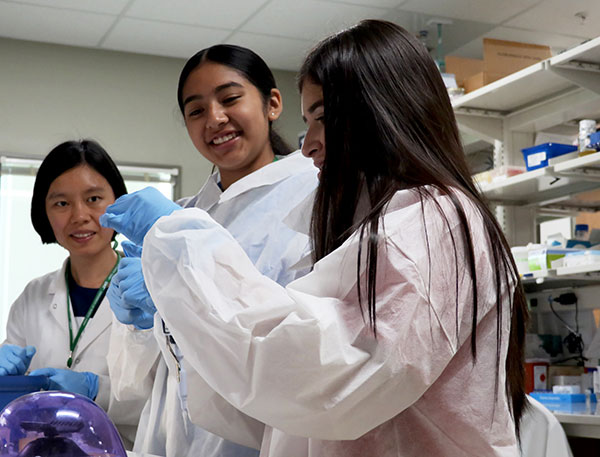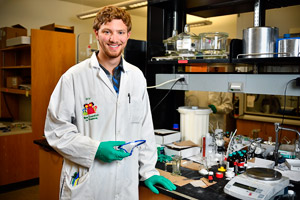|
|
|
|
|
 |
|
Planting seeds of future science discoveries
Last month, UNT's Science Summer Academy, a collaboration between the BioDiscovery Institute, the College of Engineering and the College of Education, gave middle school and high school English language learners the opportunity to learn about plant science from senior scientists in the field. The program engaged students in hands-on experience in research labs on campus with a goal of inspiring and motivating them to pursue careers in science. Over the last three summers, the students' teachers have spent several weeks learning from UNT research scientists and developing lesson plans in English and Spanish. "UNT scientists are paired up with the teachers to help expand the knowledge of the science teaching community," says Rosanna Boyd, principal lecturer in UNT's Department of Teacher Education and Administration. "Students gain exposure to university life and at the same time get a chance to see themselves as future scientists." See the students in action in a video about UNT Science Summer Academy. |
|
|
|
|
|
|
|
 NSF Research Experiences for Undergraduates NSF Research Experiences for Undergraduates
Twenty-five undergraduate students are conducting research at UNT this summer thanks to the National Science Foundation's Research Experiences for Undergraduates (REU) program. UNT has three REU-NEU sites led by senior researchers in the departments of chemistry, political science, and computer science and engineering. Each summer, the program provides funding to university-based research sites, chosen through a highly competitive review process. The program is complementary to UNT's goal of expanding undergraduate research.
|
|
|
|
|
|
| Providing a head start for TAMS research |
While many teenagers are spending their summer at the pool or playing video games, dozens of UNT Texas Academy of Mathematics and Science students are conducting research in laboratories across the UNT campus. The TAMS Early Research Scholarship and the TAMS Research Scholarship offer rare opportunities for these young students to work alongside UNT researchers in areas of their choosing to prepare them for future studies and careers in science and other fields. |
|
|
|
|
|
|
| Bringing science to life in the classroom |
This spring, first graders in Denton ISD were able to delve beyond the textbook and observe science up close using microscopes to observe fish developing from egg to embryo to larva. Aaron Roberts, professor of biological sciences at UNT and co-principal investigator with the RECOVER Consortium, worked with Melanie McGary, a first grade teacher at Newton Rayzor Elementary, to take research from his lab into classrooms at the school, where students learned about life cycles and oil spill science. The outreach was part of a grant from the Gulf of Mexico Research Initiative (GoMRI), which allocates funds committed by BP after the Deepwater Horizon oil spill. Since 2015, UNT researchers in the consortium have received $2.7 million to study the detrimental effects of oil on mahi-mahi and red drum in the Gulf of Mexico. |
|
|
|
|
|
|
| Earning prestigious Powe Award |
Tao Yang, assistant professor of electrical engineering at UNT, earned the prestigious 2018 Ralph E. Powe Junior Faculty Enhancement Award from the Oak Ridge Associated Universities for his research into the future of electrical distribution — microgrids. Yang designed a microgrid equipped with its own generator that draws power from renewable energy sources used on the UNT campus. Yang's microgrid would continue to work if the rest of campus loses power due to mechanical failure, severe weather, etc. "Traditionally, electricity is provided through one central distribution network. This means a problem in one area will affect the entire grid causing power outages and blackouts," Yang says. "Now, imagine if each user had a microgrid. People would be able to manage their own power distribution so if the main grid goes down they will still have power." |
|
|
|
|
|